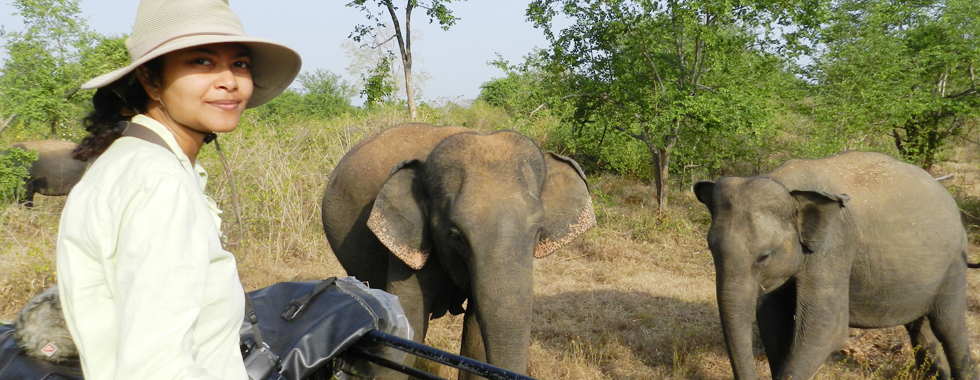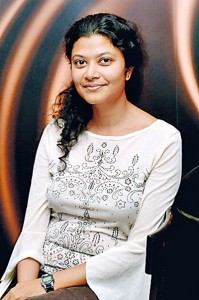Coming back home for the love of elephants
Dr. Shermin de Silva’s parents moved to the United States when she was just nine, and growing up in California meant she had opportunities to follow her dreams, it also meant she grew up a little distanced from her extended family. “A lot of people move away from Sri Lanka and don’t return,” she smiles. “I decided to do things the other way around!” Her work with the elephants of Uda Walawe means she gets to come back to Sri Lanka frequently to spend time not just with the elephants, whom she finds fascinating, but her family as well.

Shermin: At home among the elephants in Uda Walawe. Pic by Elizabeth Webber
Dr. de Silva is in Sri Lanka ‘out of season’ (she’s usually here in June or July) because she has just received the President’s Award for Scientific Publications for the years 2010-2012 (held on Friday, October 31). Organised by the National Research Council of Sri Lanka, the award was introduced in 2001 to recognise scientists whose work reaches international standards. The scheme covers all ‘hard science’ journal titles (excluding the social sciences) with a Sri Lankan institutional affiliation against at least one Sri Lankan author.
“I’ve always been fascinated with nature,” says Dr. de Silva. She studied for a degree in Biology and Philosophy at UC Berkeley and was a doctoral candidate at the University of Pennsylvania Graduate Group of Ecology and Evolution. Her research focused on animal intelligence, pitting their social systems and communication methods against that of humans. Elephants in this study fascinated her; much research had already been done about African elephants in the wild yet very little had been done about the Asian elephant in a similar backdrop.
This may have something to do with the stark contrast in landscape, she explains. “The African elephant is easy to observe whereas Asian elephants live in dense forests, making them difficult to monitor.” More significantly, it is globally rare to find large populations of Asian elephants, she shares. “Sri Lanka and India are two exceptions with quite a large number. However a lot of what we know about the Asian elephant comes from work in captivity.”

Shermin: Here in Sri Lanka for the award. Pic by Mangala Weerasekera
Dr. de Silva and her research team- Sameera Weeratunga and T.V.Kumara (both based locally in Uda Walawe)-have been carrying out their work for almost a decade now, having begun in 2005. “Our aim is to understand the elephant that lives in the wild,” she explains. “We spend a lot of time studying and observing them in their natural habitat.”
Over the years her publications on the subject have been varied; she has co-authored ‘Demography of Asian elephants (Elephas maximus) at Uda Walawe National Park, Sri Lanka based on identified individuals’, ‘A Comparison of Social Organisation in Asian Elephants and African Savannah Elephants’ and ‘An Asian elephant imitates human speech’.
Her research has revealed two fundamental conservation issues in the country-one is the illegal, but still common capture of elephant calves and the loss of habitat for elephants to roam in. “Sri Lanka’s tourism benefits from our elephants, especially due to their cultural significance. It’s in our interest as well as theirs to solve this problem,” she says.
In the States, where she resides permanently with her husband, Dr. de Silva is the Founder of Trunks & Leaves Inc. and also founded the non-profit Elephant, Forest and Environment Conservation Trust (EFFECT) in Sri Lanka. She specialises in behavioural ecology, animal behaviour, sustainability, conservation, endangered species and science communication. The communication aspect of the latter has led her to Berlin, where she is presently completing a six-month term as a Fellow of the College of Life Sciences at the Institute for Advanced Study.
Dr. de Silva hopes to continue with her work in Uda Walawe for some time. “I’ve been lucky to receive funding for my work so far,” she says. “That allows me to focus on what we need to do in Uda Walawe. But I would like to expand into other areas in the future.” She’d like to see more local partners as well, she says, adding that there are always opportunities for those interested in experience in her field.
Read more about Dr. de Silva’s work on https://asianelephant.wordpress.com/


